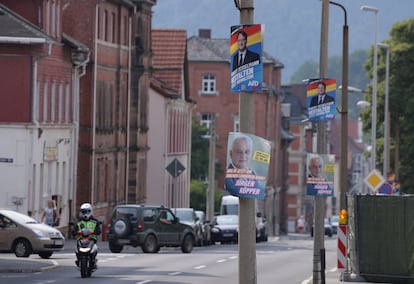‘We don’t want to be known as Nazi district’: What the far right’s first local election win means for Germany
The locals of Sonneberg are concerned about the social media calls for a boycott following the AfD’s win. The results have highlighted how dissatisfaction with the democratic system is growing in the east of the country


Sina Martin, who is the fifth generation of a family of teddy bear makers, loves living in Sonneberg, a small German town in southern Thuringia, which is known for its toy-making tradition. The 34-year-old could have moved to a big city, but she decided to stay and continue with the family business. A century ago, many houses in Sonneberg had an annex where toys were made. Today, her workshop is one of the few that have survived globalization. “I have always been very proud of my city,” says an enthusiastic Martin in the back room of the workshop, which includes a small museum featuring the world’s largest teddy bear. “But now I’m worried about what could happen here,” she laments.
Overnight, Sonneberg has gone from being practically unknown to the cover of front pages in both Germany and abroad. In a country where political parties refuse to make deals with the far right — as the atrocities of World War II are still very present in the collective memory — the victory of the Alternative for Germany (AfD) in the June 25 district elections in the Sonneberg has triggered a political earthquake that has shocked the country, particularly Berlin. For the first time in history, a politician from the far-right group — 50-year-old lawyer Robert Sesselmann — will govern a district in Germany.
“We don’t want to be known as the Nazi district,” says Martin, who says that some local businesses have begun to notice the effect of the social media calls to boycott the area. According to the local press, bookings at a couple of hotels in Sonneberg have been canceled. Martin, who has received a couple of nasty emails, is asking for people not to make generalizations about the district. “We are not like that, or at least the people around me aren’t. I don’t know anyone who has voted for the AfD. Maybe I live in a bubble, but I was the first to be surprised by the election results,” she says.
Sesselmann won 53% of the votes in the runoff against the candidate from the Christian Democratic Union of Germany (CDU) party, who had been supported by all the other parties, including the post-communist Die Linke (The Left). But the united front was not enough to stop the AfD, which is leading in the polls in several states of the former East Germany, including Thuringia. The popularity of the AfD in the east of the country is why, nationally, it is second in the polls, with 18 and 20% support, behind only the CDU, and marginally ahead of the Social Democratic Party (SPD).
Martin does not know Sesselmann. Nor has she met Roland Koch, 79, a veteran local politician from Die Linke, who attributes the success of the AfD to general discontent with the political class and the “continuous fights” between the parties that make up the government coalition: SPD, Free Democatic Party and The Greens. For Koch, the pandemic and the war in Ukraine have made people feel vulnerable, and in response, they have voted in protest of the government.
Sesselmann avoids the media, while his office rejects requests for interviews. His election campaign focused on other than the local district, including slogans such as “abolish the euro,” “close the borders,” “protect women from Islam” and “against sanctions, in favor of cheap gas from Russia” — which can still be seen on the campaign posters in the streets of Sonneberg. A reporter from Germany’s public radio network Deutschlandfunk spoke to him briefly, and he declined to answer questions about fascism or Björn Höcke, the controversial AfD ledader in Thuringia. Höcke has been classified as a right-wing extremist, as has the AfD’s branch in the state. This allows the German intelligence agency known as the Office for the Protection of the Constitution to monitor the group. Nationally, the AfD is “suspected” of radicalism.
It was only a matter of time before the AfD’s lead in the polls translated into an electoral victory, says Marcel Lewandowsky, an expert in right-wing populism from the University of Duisburg-Essen. The party was on the brink of winning the district election in Oder-Spree in Brandenburg. In the end, it was defeated by a narrow margin in the runoff and only after all the other groups united to support the SPD candidate. “Since the so-called refugee crisis in 2015, the AfD has established itself in the German party system both at the federal and state levels and is well represented in municipalities and regions,” explains Lewandowsky.
The expert says it is important not to “overestimate the effect of government policies” in the far-right’s win in Sonnenberg. “Yes, there is discontent with the coalition, but support for the AfD is due above all to a belief in the party’s political demands,” he says. In other words, in many cases, people vote for the AfD because they agree with the party’s ideas. Recent studies show that radical right-wing and authoritarian attitudes are more accepted in Eastern Germany — where two-thirds of inhabitants are dissatisfied with democracy — than in the west of the country.
"A unique and strong party"
“Many people in the eastern states do not want greater democratic participation and the safeguarding of basic democratic rights, but the apparent security of an authoritarian state,” says Oliver Decker, the director of the latest study from the University of Leipzig on political attitudes, which was presented last Wednesday in Berlin. The work, which has been in progress for 20 years and is based on 3,500 interviews, reveals a trend towards a conspiratorial thinking, lack of trust, skepticism of political system and the belief that there is no point in getting involved in politics because citizen lacks influence. According to the study, two-thirds of East Germans show a marked longing for the dictatorial German Democratic Republic (GDR), while many want “a unique and strong party that embodies the national community.”
The far right’s ideas have found fertile ground in the east, especially in Saxony, Saxony-Anhalt and Thuringia, where more than a quarter have hostile feelings towards foreigners, according to the research.
Stefanie Leipold, 34, says that she has nothing against foreigners “who come to work and pay taxes like the rest,” but is upset that “they come to live at our expense, or to commit crimes.” “I think there are too many,” adds Leipold, who works in an office in the center of Sonneberg. She says she voted for the AfD due to the economic situation in Germany, inflation, and the lack of affordable housing. Before, she says, she voted for the SPD.
Sonntag wurde in #Sonneberg ein #AfD’ler zum Landrat gewählt. Montag verteilte ein #Neonazi in Kindergarten der Region übrig gebliebene Luftballons der AfD. Auf seinem Auto „Ehrenamtlicher Abschiebehelfer“. Auf seinem T-Shirt Aufdruck „Wehrmacht wieder mit“.
— Katharina König-Preuss 🍓 (@KatharinaKoenig) June 27, 2023
Es ist nur krass. pic.twitter.com/hvQA0qcQDb
Meanwhile, in Sonneberg, tensions are high after a video released Monday showed a man handing out leftover balloons from the AfD victory party to local kindergarten. In the footage, the man is seen wearing a T-shirt praising the Wehrmacht, the Nazi army and pants with the colors of the Reich (black, white and red), while his car has a sticker that reads “Volunteer deportation agent.” AfD claims that the man does not work for them, but a journalistic investigation revealed his links with the party.
“For a neo-Nazi, obviously uninvited, to target our little ones and target kindergarten children, that is a serious offense,” Helmut Holter, Thuringia’s Minister of Education, said on Twitter. The police are investigating the case, although they have not seen evidence of a crime, but rather of an offense for disturbing public order.
“There is fear and uncertainty,” says Sahin Ali, the owner of the Ali Baba Turkish restaurant, who immigrated to Germany in 1980. “People don’t know if we are going to get better or worse. We will have to wait.” He is not particularly worried. He says that he has never felt like a victim of racism, and says he understands those who believe that there are too many refugees: “Germans are worried about what it will cost them.”
The AfD’s symbolic win in Thuringia may just been the beginning, as elections are scheduled to be held next year in Thuringia, Brandenburg and Saxony. The AfD’s success puts the conservatives in the CDU in an especially hard position. For now, the party is remaining firm in its refusal to collaborate with the far right.
Sign up for our weekly newsletter to get more English-language news coverage from EL PAÍS USA Edition
Tu suscripción se está usando en otro dispositivo
¿Quieres añadir otro usuario a tu suscripción?
Si continúas leyendo en este dispositivo, no se podrá leer en el otro.
FlechaTu suscripción se está usando en otro dispositivo y solo puedes acceder a EL PAÍS desde un dispositivo a la vez.
Si quieres compartir tu cuenta, cambia tu suscripción a la modalidad Premium, así podrás añadir otro usuario. Cada uno accederá con su propia cuenta de email, lo que os permitirá personalizar vuestra experiencia en EL PAÍS.
¿Tienes una suscripción de empresa? Accede aquí para contratar más cuentas.
En el caso de no saber quién está usando tu cuenta, te recomendamos cambiar tu contraseña aquí.
Si decides continuar compartiendo tu cuenta, este mensaje se mostrará en tu dispositivo y en el de la otra persona que está usando tu cuenta de forma indefinida, afectando a tu experiencia de lectura. Puedes consultar aquí los términos y condiciones de la suscripción digital.








































